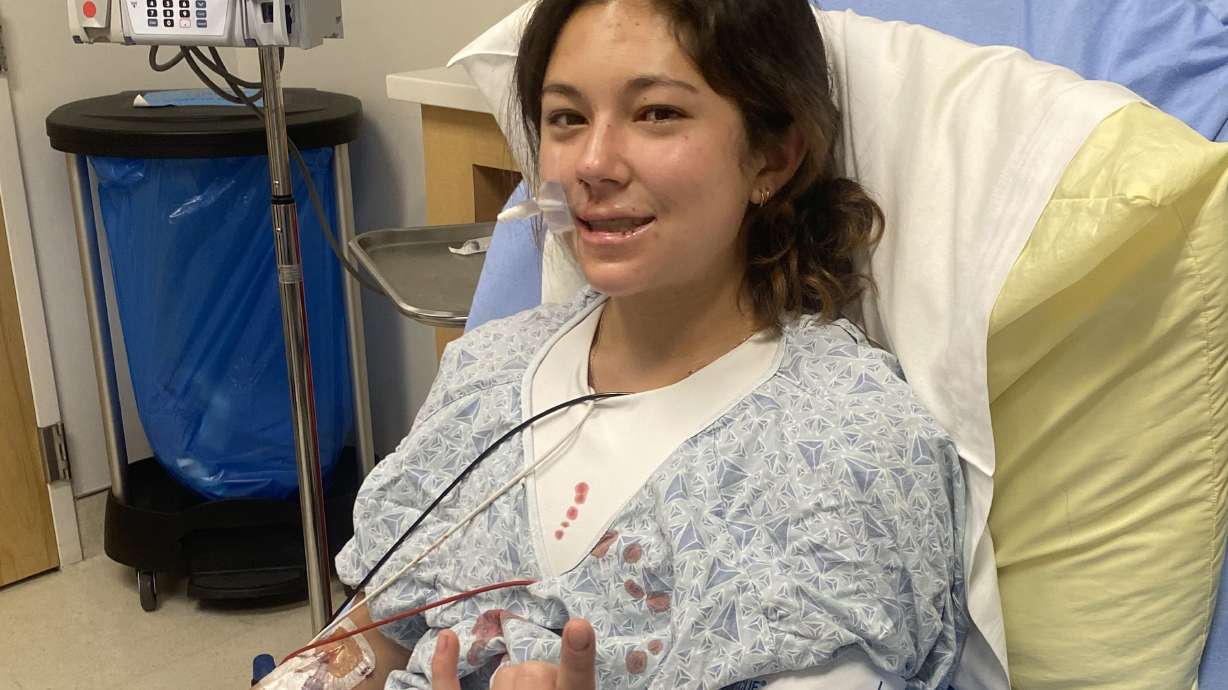Estimated read time: 4-5 minutes
This archived news story is available only for your personal, non-commercial use. Information in the story may be outdated or superseded by additional information. Reading or replaying the story in its archived form does not constitute a republication of the story.
SALT LAKE CITY — For Kaiya Endo, what started as extended nose bleeds, chronic fatigue and easy bruising ended up in emergency room visits, hospital stays, college deferment and a need for stem cells.
The 18-year-old from Murray thought she just caught a cold that was floating around her dorms at California Polytechnic State University, but in October she was instead diagnosed with aplastic anemia — a rare blood condition where her bone marrow doesn't produce enough blood cells for her to function.
"I went to the (emergency room), and they were doing labs and they ran my blood. The doctor came in and he was like, 'It's a really good thing you're here because you have, like, no white blood cells. You've got no platelets. This is very strange,'" Endo said.
Options for treatment of aplastic anemia are extremely limited, especially since Endo is so young, restricting access to a bone marrow transplant due to her unique ethnicity, which is 50% Japanese, 50% Caucasian. She explained that because her parents would only be a half-match, and due to the age difference, there are too many risks involved with a transplant from them.
The risk of relapse is too high for treatment options outside of bone marrow transplant, so the only viable solution is for Endo to be placed on Be the Match's stem cell donor registry.
Be the Match representative Cindy Phippen said, "Because matching is done genetically, racial and ethnic background is a significant factor in that matching. For many, many sociocultural reasons ... there's a pretty stark ethnic disparity in the odds of finding a match."
If Endo is unable to find a match, she will be at risk of developing a severe fungal infection, which can be fatal.
To donate stem cells, there are many more factors that need to match up besides blood type. Be the Match uses a system that takes swabs of potential donors' cheeks and "types" the donor's immune system, which is a similar idea to blood type but with many factors involved — especially genetics. The swabs are sent through the mail when someone requests them through the Be the Match website.
Once the immune system is categorized, the donor is then put on a list that will help match them up to someone in need of stem cells who has the same immune system type. The catch is that someone can be on the donor list for years before being matched to someone, if ever.
If Endo can match with someone, another difficult process will begin.
Once a donor is found, Be the Match verifies the donor's willingness to help and then sends the donor to do physicals and proper bloodwork to make sure his or her immune system was typed correctly. The donor will be sent to a hospital or collection center that corresponds with where the recipient is — sometimes out of state — to donate. Be the Match takes care of all medical and travel expenses.
For Endo to receive the stem cells, she said, "They basically have to completely destroy your immune system to make room for the new immune system." To do so, she will go through a cycle of chemotherapy, radiation and immunosuppressive therapy. Then the stem cells can be transfused and Endo's bone marrow will be closely monitored for improvement.
Whether Endo can get a donation or not, she is hoping good for others can come from her situation. She is seeing a lot of friends and family join the registry, which will potentially help others in need of stem cells.
Phippen said Be the Match has teams that seek out ethnically diverse donors by going to historically black universities and finding communities of Asian Americans, Pacific Islanders and other groups.
In 2022, Be the Match supplied 6,700 bone marrow transplants across the United States.
For answers to frequently asked questions, more information and to request a cheek swab kit from Be the Match, visit bethematch.org.










